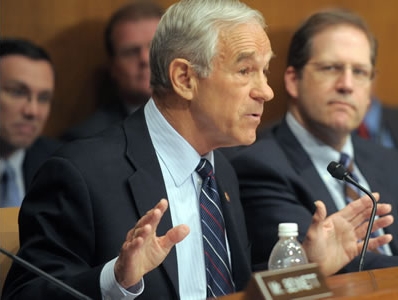Ron Paul takes heat as he challenges the bipartisan status quo on national security spending

Apologists for the Military-Industrial Complex generally use one of two methods to prevent an outbreak of rational thought that would undermine the subsidization of history's most privately-profitable yet publicly-costly endeavor – war. Now, a new tactic is making its debut in response to Republican presidential candidate Ron Paul's unabashed remarks about the unsustainable economic burden of military empire, remarks he gave during last week's Republican presidential debate in Tampa. Daily Caller Senior Editor Jamie Weinstein's recent Op-ed titled, “Ron Paul's foreign policy fallacies” employs this latest technique as it addresses Paul's fiscal argument against militarism.
To better understand Weinstein's third approach, let's review the first two methods of persuasion from which he gains inspiration:
Aiming for a climate of uninformed consensus, the first strategy employs silence and a measure of willful ignorance concerning the inconvenient facts about empire's detrimental affect on the economy. If you don't have a good response, its best not to respond at all. Simple enough, but every once in awhile the matter of empire and its relationship to the economy finds its way onto the national stage, like in 2008 when Paul repeatedly harped on the subject during his previous run for president. Back then, the apologists were forced into rare form, becoming rhetorical ninjas trained in the art of eluding a debate and assassinating its messenger rather than risk dignifying the message with a response. Shooting the messenger is the second tactic. Apologists found their tasks easy at a time when the public weren't even aware that there was a systemic problem with the economy.
It seems that with Paul surging to the top-tier of Republican contenders, as indicated by his strong straw-poll performances and double-digit standing in several national polls, critiques of American empire are no longer emanating from the fringe. If Paul's message of non-interventionism is indeed going mainstream, then it makes sense that apologists are desperate to frame the debate over excessive national security spending with good ol' fashioned denial. The third tactic can be summarized as using the same approach as the second only, in place of the messenger, the object of derision is the message itself. The message must be killed, altered or at least opposed by one that remains (to use Weinstein's words) “beyond serious dispute.”
Constitutional lawyer Bruce Fein does a great job of refuting Weinstein's assertion that “America is in trouble financially, but not because of our defense budget” in his editorial response. Fein supports his own arguments with actual figures from President Obama's official 2012 budget request. Total military spending, Fein points out,
“brings the national security budget of the United States for FY 2012 to a staggering total exceeding $1.2 trillion, or approximately one-third of the entire budget and almost 100 percent of the projected budget deficit.”
The US national defense budget is the largest military budget in human history. It could be slashed by 75 percent to $300 billion and still remain the largest defense budget in the world, says Fein. These numbers truly do speak for themselves.
The problem with Weinstein's argument is that he's not actually talking about causes. He focuses on “projections of future deficits,” on “future spending” and on identifying the “engine of our growing debts.” But, it's not future spending or debt that is in question, it's the unsustainability of all mandate-created liabilities that Congressman Paul is trying to debate and this includes our generous budgeting for war. It's about a reevaluation of the fiscal policy that has driven the nation to insolvency and that actuates America's foreign policy right now.
For Weinstein, it's as if these corporate entitlements going to the Military-Industrial Terrorism-Complex (Fein's phrase) don't qualify as a part of the entitlement scheme that he himself calls the prime mover of our economic woes. To this line of thinking Fein's words provide the best response:
“our nation now confronts a choice between empire and financial solvency. It cannot have both. And neither can Mr. Weinstein.”






